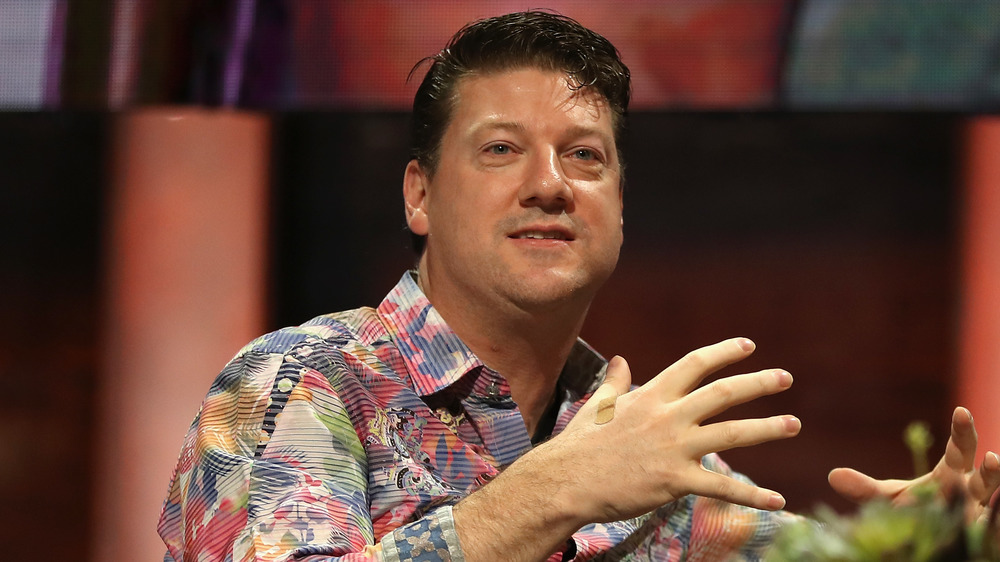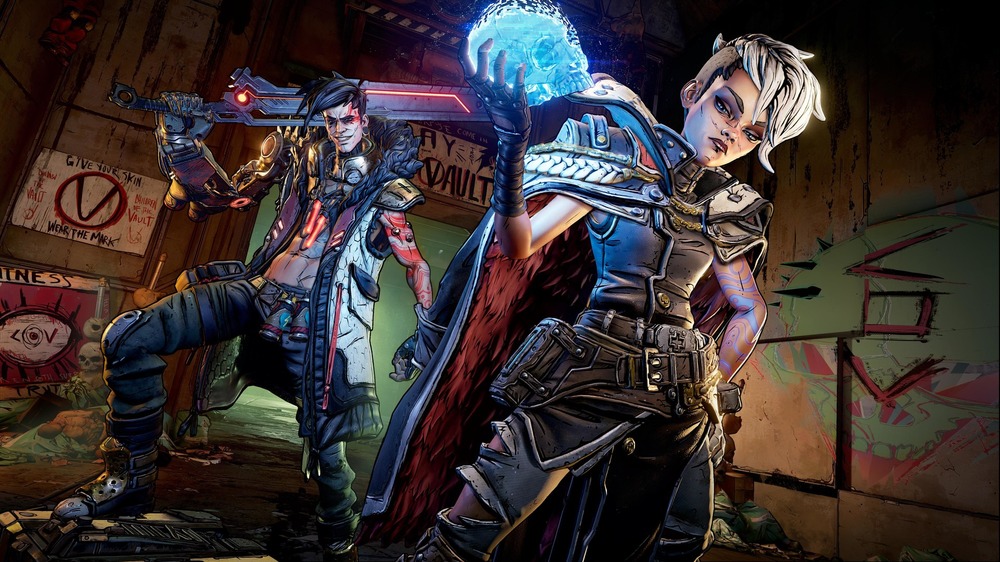The Shady Truth About Borderlands Creator Randy Pitchford
Blurt out the first video game director or producer who comes to mind. You will probably jump to Shigeru Miyamoto, Hideo Kojima, Cory Barlog, or Neil Druckmann. These people have their fingers in games we love (and in some cases hate) and have their names plastered all over their babies, so it's easy to think about them. Now try the same with a game studio's president. Odds are you can only think of one person: Randy Pitchford.
Randy Pitchford might be the current president and CEO of Gearbox Software, but he is a man who wears many hats. He put on his coding cap for Duke Nukem 3D, and he dons a wizard's hat whenever he performs magic tricks. He also has the unfortunate habit of wearing the neon beanie of controversy. The man might be synonymous with the Borderlands franchise, but he's also synonymous with numerous questionable if not downright contentious activities, and not just because of Aliens: Colonial Marines. Here are but a few of the problems inexorably tied to Pitchford.
His Twitter account is a sight to behold
Randy Pitchford is a vocal individual. If he wants to talk about a product, nothing can stop him. And if he likes a game, he will defend it until his dying breath. However, this behavior has gotten him in trouble, especially on Twitter.
To put it bluntly, Twitter is where Pitchford continually puts his foot in his mouth. One of Pitchford's most ignominious Twitter fits occurred when he accused Eurogamer of "shoddy journalism." Why? Because the site announced Borderlands 2. Apparently, Pitchford wanted to give another site that honor, but Eurogamer beat them to the punch with some old-fashioned investigative journalism.
More recently, Pitchford unloaded vitriol against Game Informer when the site explained that when he said Borderlands 3 wouldn't include microtransactions, he meant it wouldn't include the pay-to-win kind. He called this helpful article a "sh*tty clickbait" headline. Pitchford also told everyone who criticized his decision to release Borderlands 3 through the Epic Games Store to "f*ck off."
However, Pitchford's most tone-deaf Tweet "tried" to honor George Floyd ... by using his death as an excuse to sell Duke Nukem 3D.
Borderlands 3 turned into a minefield
Randy Pitchford owes some of his most recent controversies to Borderlands 3.
Instead of going directly from Borderlands 2 to Borderlands 3, the series made a quick pit stop into spinoff territory with Tales from the Borderlands, starring Troy Baker as Rhys. When Gearbox revealed Rhys would return in Borderlands 3, audiences hoped Baker would as well, but Pitchford claimed Baker turned down the role. Baker quickly refuted that claim, stating the company didn't want him back. Soon after that bombshell, Claptrap's original actor, David Eddings, made similar accusations. Pitchford asserted that Eddings declined an offer to reprise his role in Borderlands 3, but Eddings stated no such offer was ever made — just like Baker reprising Rhys. Oh, and Eddings was no longer with Gearbox because Pitchford allegedly physically assaulted and rage-fired him.
Matters didn't improve after Borderlands 3 released. Despite the game selling like crazy, Pitchford reneged on contractual company bonuses. Gearbox's developers already make below-average wages, and many complained. How did Pitchford respond? By telling his employees that if they weren't happy, they could just quit. In the middle of a pandemic.
The allegations keep piling up
Eddings isn't the first person to accuse Randy Pitchford of potentially illegal activities. Ex-Gearbox lawyer Wade Callender charged Pitchford with pocketing $12 million, among other illegal actions, and Duke Nukem 3D's composer tried to sue Gearbox for using his music in the game's 20th-anniversary remaster without his consent. While both of those lawsuits have been cleared up, one of Callender's accusations stuck, ironically because Pitchford was proud of it.
According to Callender, Pitchford left a USB drive in a Dallas, Texas, restaurant. The drive was supposed to only contain sensitive documents for Gearbox employee eyes only, but upon further research, Callender surmised that it also contained adult videos featuring an underage girl. Pitchford's defense? The girl was actually 18, and he watched the video because it contained a "magic trick." Also, he wanted the girl on the cover of a magic magazine.
Given Pitchford's history, nobody expected him to own up to his mistakes, even if virtually everyone questioned the logic of stashing personal (and highly questionable) material next to important work documents.




